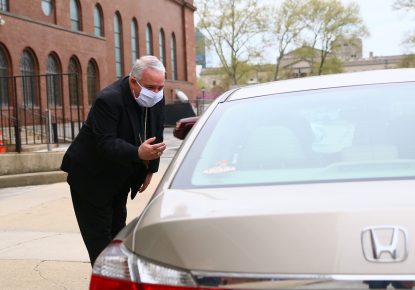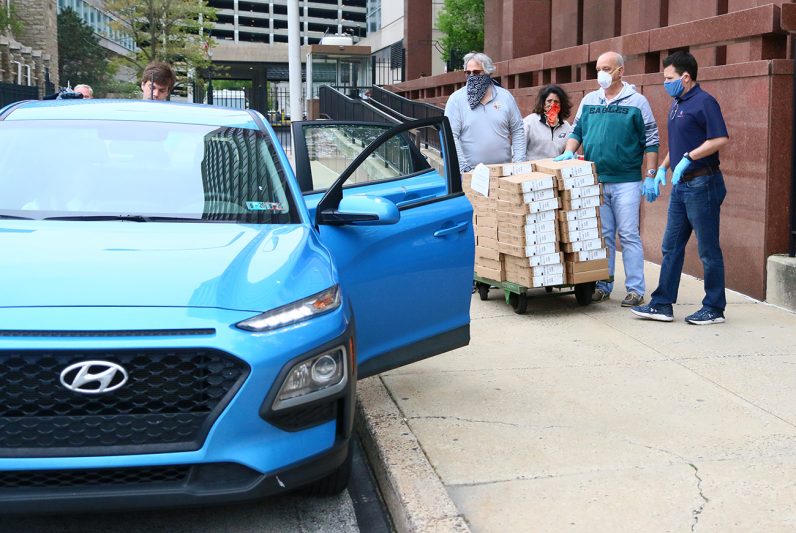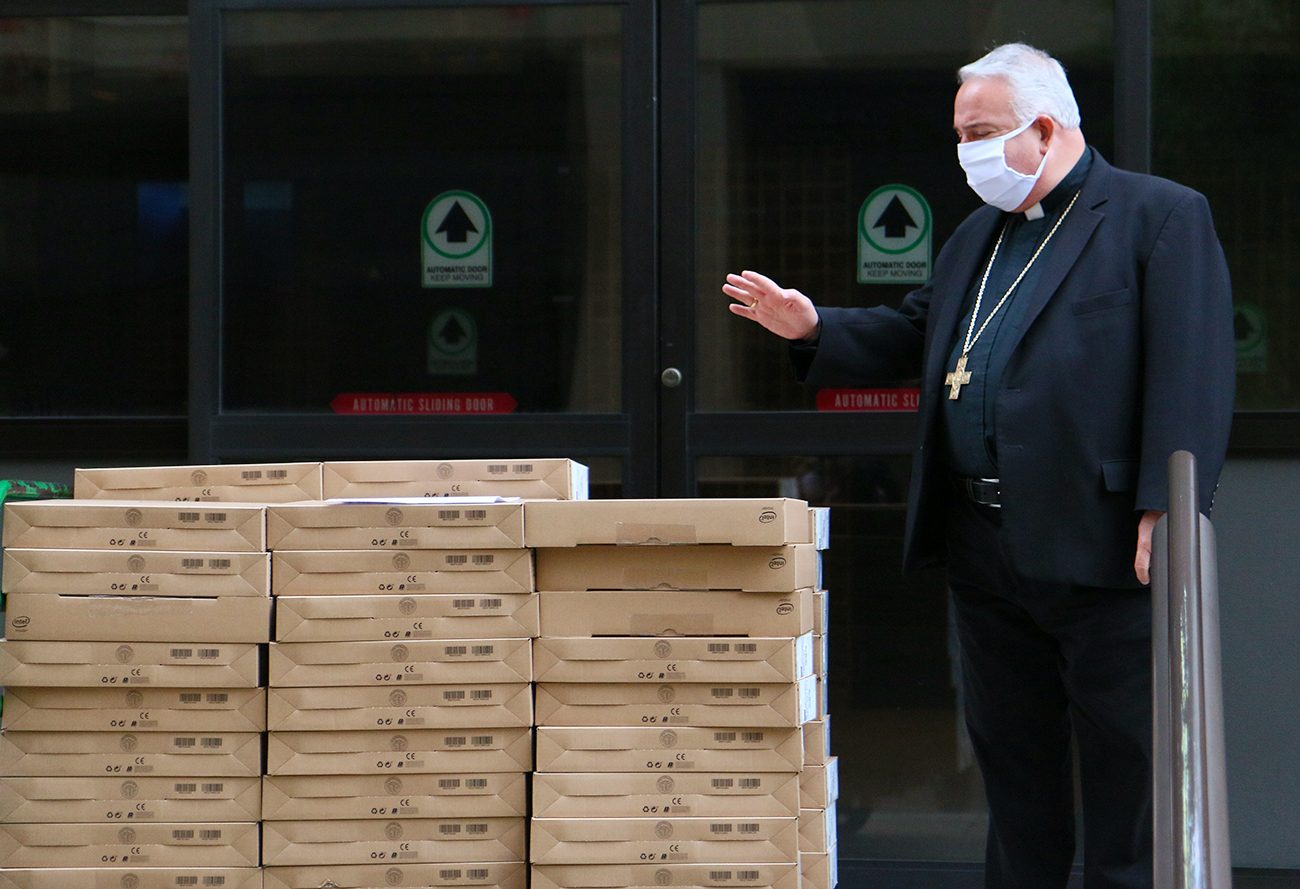Some 760 students from 16 archdiocesan schools will receive Chromebooks to continue their education online during coronavirus stay-at-home orders.
The archdiocesan Office of Catholic Education (OCE) purchased the devices through a grant from the Philadelphia School Partnership (PSP), a charitable consortium that pools donor funds for investment in area schools.
Wearing a face mask and foregoing the use of holy water, Archbishop Nelson Perez blessed the computers Monday morning, April 20, saying he was “very grateful to PSP” and to archdiocesan teachers and administrators, who “hadn’t missed a beat” in continuing student education as schools remain closed.
[hotblock]
The machines were then made available for curbside pickup by school administrators, having been stored for 72 hours prior at the Archdiocesan Pastoral Center as a decontamination precaution.
Due to the pandemic, archdiocesan schools shifted to a “flexible instruction” format on March 16, drawing on previously developed emergency plans and the guidance of a task force convened by Philadelphia Auxiliary Bishop Michael J. Fitzgerald, who oversees Catholic education in the archdiocese.
William Brannick, OCE’s director of technology for grades preK-12, said his office had been working “over the past five to six years to increase the level of technological access” within archdiocesan school buildings.
The coronavirus pandemic had “certainly flipped the switch” on making sure students had computers at home, he said, which is of “extreme importance” for student learning outcomes.
“The ability that technology brings to extend student engagement is phenomenal,” he said. “We’re making sure that access at home is equitable.”
As stay-at-home orders expanded and classes moved online, school districts throughout the nation have had to confront the “digital divide,” with thousands of students lacking access to computers and high-speed internet connections.

Archbishop Nelson Perez talks to administrators picking up new Chromebooks for archdiocesan Catholic school students, April 20. (Sarah Webb)
According to the most recent census estimates, almost 15,000 Philadelphia children did not own a computer in 2018, while close to 22,000 did not have internet access at home.
In a 2019 survey, the city’s school district determined that only 45% of students in grades three to five accessed the internet at home using a computer.
The rates were only slightly better for grades six through high school, ranging from 56% to 58%. Last month, the Philadelphia School District’s Board of Education approved the purchase of up to 50,000 computers for students.
The OCE Chromebooks are part of a decade-long trend toward a deep “integration of technology” with the everyday educational process, said Brannick.
“Since 2008, when iPads were introduced into the classroom, you saw a maturation, and an ability for students to direct their own learning,” he said.
Brannick described Chromebooks as “the perfect device” for archdiocesan school students.
“They are very affordable, and they work directly with our G Suite for Education,” he said.
[tower]
The Google platform provides an array of free applications that enable teachers and students to work collaboratively online, using email, group calendars, shared documents, forms and video calls.
Unlike standard laptop computers, Chromebooks require an internet connection to function, and Brannick said teachers and administrators had been working to identify families without internet access.
“We’ve put together a menu of resources for parents, with different offerings from Xfinity, Sprint or T-Mobile,” he said.
Students will have leeway for “some personal use” of the school-owned machines, said Brannick, “but certainly the first and foremost expectation is that these devices are to be used for academic purposes.”
The OCE team is also providing schools with several security options, including its preferred software, the GoGuardian Suite.
“It allows the teachers greater control in the classroom, and when the devices go home, the software can identify if the student is doing any inappropriate searches,” said Brannick. “Certain keywords will trigger an alert to the school administration, and parents are made fully aware of that before the devices are sent home.”
The archdiocesan Office for Child and Youth Protection (OCYP) has stressed the intensified need to protect children from online predators as classrooms have moved online.
“Predators have a prime opportunity now, because most of what we’re doing right now is online,” said OCYP director Leslie Davila. “They’re looking for ways to engage minors in sexually explicit conversations and in sharing videos.”
She also stressed the importance of maintaining appropriate boundaries when using online collaboration platforms such as Zoom and Google Classroom.
Parents should “take a look at what’s behind them” when children are on screen, she said, since personal items and photographs can divulge information that makes kids vulnerable.
Davila recommended “creating a virtual classroom setting, with nothing personal in the screen view.”
She also advised against having children participate in online classes “while lying in bed or in their bedrooms at all.”
“Keep online learning a formalized, supervised experience,” she said.
That advice — along with the newly purchased Chromebooks — will remain timely after the pandemic subsides, said Brannick.
“When we go back to school, whatever that new normal is, our teachers are going to have a lot more tools in their tool belt to be able to engage the kids in many different ways,” he said.

Chromebooks purchased by the archdiocesan Office for Catholic Education, thanks to a grant by the Philadelphia Schools Partnership, are loaded April 20 at the Archdiocesan Pastoral Center for delivery to St. Katherine of Siena School in Northeast Philadelphia. (Sarah Webb)
PREVIOUS: Domestic violence ‘a pandemic within a pandemic,’ says Catholic psychologist
NEXT: Catholic high school students collect snacks for health care heroes



Share this story